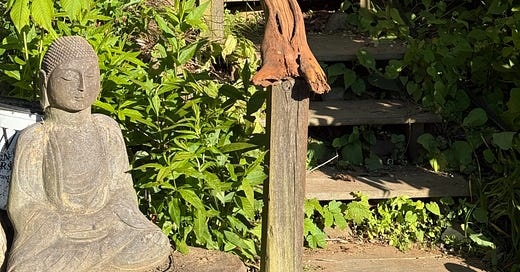Eventually, if one lives within organic and cosmological sensation for long enough, and it becomes permanent enough, it establishes itself as the primary interpretive mechanism for most of one’s experience at its foundation.
This is not to say that many other dimensions, especially feeling, don’t come into play; or that the sublime and inexplicable presence of goodness and God doesn’t leak into everything like the very best kind of honey.
But our organic sensation is constantly surprising, and it begins to tell us things we cannot know with the mind.
This simple railing made of Osage Orange, a durable hardwood which I collected myself from the forest, is today a good example.It replaced a couple of two by fours on the steps leading into the second level of our garden. Much oddball jury rigging was required; and there was plenty of blood and sweat, if no tears.
What was striking about the railing once it was installed and sanded, which involved removing many hard-core twig knots and rough places all around the surface both top and bottom, was how much better it supported a person moving up the stairs. First of all, the hand curves so much more naturally around a rounded shape; and secondly, it turns out the hand wants to have irregularities to explore and adjust to on the way up and down the stairs. Railings that are consistent and straight may look good, but they don’t provide the intelligent interaction with the environment that the physical body actually wants, an interaction in which irregularity is the norm.
After I finished the railing and was treating it as an experience, I observed this peculiar yet entirely natural relationship between the impressions of irregularity, the intelligence of the hand, the adjustments that it made, and the interesting satisfaction that results from organic sensation in contact with a responsive and irregular surface that provokes a deeper wish for relationship than a regular surface would.
It makes me wonder how many other things in life ought to be this way.
Certainly, we need regularity – I myself thrive on routine and suffer when it is broken. Yet we also need irregularity, because it provides stimulus; and without stimulus, sensation and impression become less and less valuable to the inner parts of being. This is one of the reasons that Gurdjieff said the organ kundabuffer caused human beings to derive pleasure from doing the same thing over and over again (Chapter 10) : what he was saying was that all of the parts of the human being, not just the emotions, but also the mind and sensation, should be actively immersed in and engaged with irregularity as much as possible, but that instead we try to make everything regular so that it is predictable. In doing this, we actually avoid having a relationship with the planet and with what is taking place on its surface, because we appear to have tamed it. Of course nothing could be further from the truth; but human beings always love to flatter themselves with the impression that they are in control of everything.
In point of fact, we are designed from the beginning to travel irregular roads, as Gurdjieff also pointed out in his retelling of the traditional yoga parable about the carriage; it was made to travel rough roads, which helps lubricate the joints. So even the irregularity of a railing on a staircase may contribute to an increasingly cosmological sensation of life, helping the impressions we take in to sink a little deeper into being.
Each impression we take in more deeply is connected to the awakening of the inflow. Without the inflow being awake, we ourselves are fundamentally removed from any sense of the cosmos. In this sense, it is important to make good things that stimulate unusual impressions and encourage us to discover sensations of life that are quite different than what we expect. Of course, that was the whole point of the movements in the first place; and yet the potential for these unusual impressions of posture, touch, expectation – yes, expectation itself is a posture – in ordinary life to bring us to something quite new within being is also there. It is as though what we learned in the movements class were taken out into life and applied: attention, sensation, something unusual, perhaps even unexpected: but I am prepared.
I think we need to have a much more peculiar and unmanufactured experience of the planet and life. This is not in terms of the gross gist of everything, which cannot be changed, but in the details of what we contact. We are meant to be in continuous contact with a very rich life; and in order to do that, we have to understand it through sensation, not through the head. The wealth comes through the experience of being, not the things that we have.
warmly,
Lee






Lee, this is an important essay. Thank you for bringing this subject to my sensitive awareness. I would add that walking in the woods on bumpy or rocky paths is much more body friendly than perambulating city streets.
Thanks Lee, I had not made the connection in those terms.